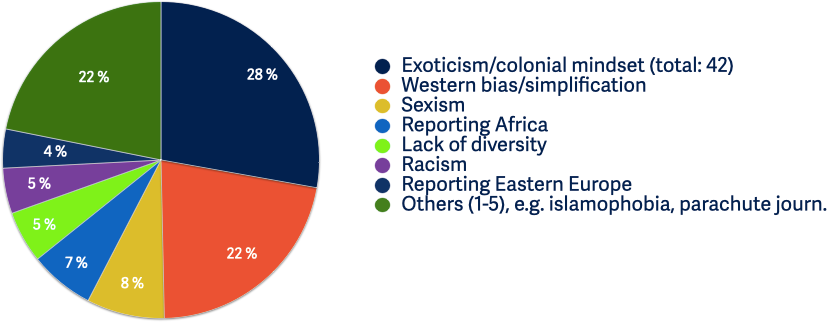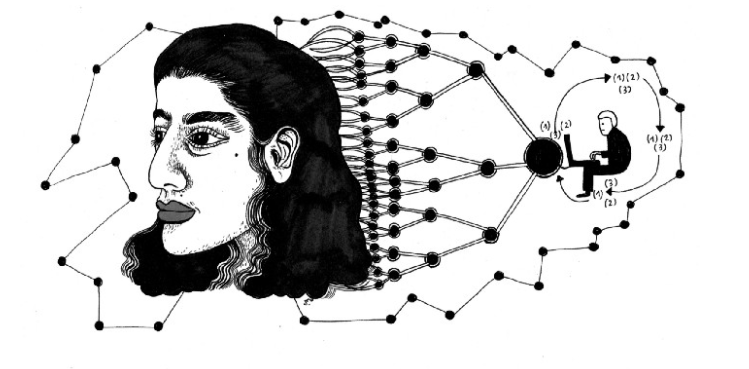Diversity isn’t a moral case. Let’s talk about quality journalism.
By Tabea Grzeszyk
I don’t want to sugarcoat this. When the COVID-19 pandemic hit, Hostwriter started to get into trouble. With a donor table canceled and foundations re-evaluating new commitments, our philanthropy-based business model — that has worked successfully for the last seven years — fell into pieces. “Necessity is the mother of innovation,” says the cliché and I guess there’s a grain of truth in it. As it became increasingly clear that providing a network that helps journalists collaborate across borders wasn’t enough to survive as an organization, we asked ourselves: What’s our biggest asset at Hostwriter? What are we most fond of and how can we genuinely contribute to positive change in the field of journalism?
This is what we came up with:
- Hostwriter is one of the most inclusive journalism networks in the world. Based in 154 countries, our members include journalists whose voices are marginalized on the basis of their ethnic origin, gender, disability, class, age, religion or geographical location.
- At a time when newsrooms in the United States remain more white and male than other work places, the largest migrant communities in Germany have no representation among editors-in-chief at leading news outlets and Indian media is an upper-caste fortress, Hostwriter will launch a newsroom for cross-border journalism that’s as diverse as the audience it serves.
- Starting in spring 2021, we’ll create collaborative stories for people who value multiple perspectives of marginalized journalists across the globe. Diversity isn’t a moral case, it’s about quality journalism in the public interest.
Community-driven journalism
We want this newsroom to reflect our mission to “Unbias the News,” making sure the global community of Hostwriter members have a say in how the project is shaped, rather than us — a predominantly white, Western team of journalists based in Berlin — calling out the relevant decisions. As a starting point, we will establish an editorial board with colleagues from different continents to ensure a diverse, global outlook for story selection and commissioning. To get a better grip on the next steps, we reached out to our network with a community survey and asked for input.
Over the course of a weekend, 165 members, newsletter subscribers and social media followers participated in our community survey that ran between Friday, 30 October and Monday, 2 November. We soon closed it at almost 200 respondents to make sure we had the capacity to make sense of the data (first lesson learned: open text fields allow maximum freedom to respondents, but they take a lot of time to analyze!).
This is what we learned from our community:
- The Hostwriter community deeply cares about many different global movements. With 17% each, Black Lives Matter and movements against press censorship were mentioned the most, followed by #MeToo (15%).

This is how two respondents put it:
“Do I really have to choose? I would say all of them, but if I think about movements that I actually participated in: Black Lives Matter, press censorship, failing migrant policy (Moria) and Climate March.” / “If a movement is intersectional, I’m on their side 🙂“
2. When asked about which blind spots or stereotypes in journalism have bothered them, if any — 28% of respondents shared stories that referred to a “Exoticism/colonial mindset,” followed by stories that mentioned “Western bias/simplification” (22%).

“Colonialism and Western-centrism. For example, I remember the media coverage of India making homosexuality legal being all about how ‘India reached the Western standards’, ‘India moving into the 1st world’ and stuff like that, while the former law that made homosexuality illegal was a colonial law imposed by England.”
“Innovation in the news and media sector doesn’t come from Silicon Valley but from Asia and Africa where a new generation of news consumers demands to be facilitated with trustworthy information.”
3. In terms of underrepresented perspectives, the Hostwriter community is most interested in female journalists (90 respondents), journalists from ethnic minorities (83 respondents) and journalists based in the Global South (76 respondents).

We are excited to develop this project together with our community, building on an initial project grant by the German Bosch Foundation.
Would you like to become involved? Please sign up to our Newsletter to be among the first to know about calls for pitches as the project kicks off!
Are you a journalist or a publisher who shares our mission? We’re open to partnerships and collaborations and would love to hear from you.
Please drop us a note at unbias@hostwriter.org.

